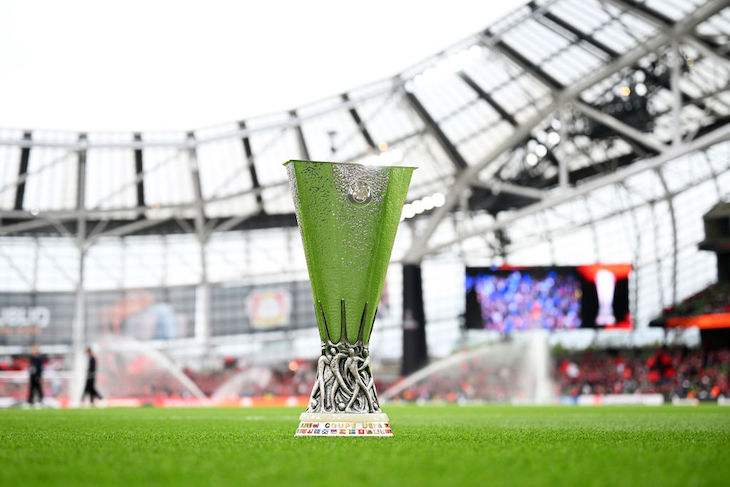Two of world football’s biggest but worst performing clubs Manchester United and Tottenham Hotspur face off in Bilbao on Wednesday in the Europa League final. There is quite a lot at stake, not only Europe’s second most important club title but the substantial bonus of a place in next year’s Champion’s League (worth an estimated £60 million) and with it the kudos to attract top players. It’s been called back door entry to UEFA’s elite tournament, but it feels more like a magic portal transporting the currently humdrum aspirant super clubs into another dimension, and not one where they necessarily belong. If football is all about stories, this is a very odd one.
Both Man Utd and Spurs have had atrocious seasons
Both Man Utd and Spurs have had atrocious seasons and would be dicing with the ultimate indignity of relegation were it not for the even more pitiful form of Ipswich, Leicester and Southampton (now that would have been a good story). The idea that either might end the season with silverware is bizarre. Many would say neither club deserves to be anywhere near the Champions League. As a Spurs fan of the ‘Ozzie’s dream’ and Super Glen era, I would struggle to argue with that. I would categorise this season as just about the worst I’ve ever seen. I’m more embarrassed than excited by Wednesday’s game.
I also feel disturbed by what the Europa League final reveals about the current state of English and European football, and how far we have drifted from the gloriously straightforward days when I first started watching in the late 1970s. Back then, there was no ‘Champions League’ or ‘Premier League’; there was the gloriously simple, it is what it says on the tin, ‘First Division’, and the perfectly democratic, and hard as hell to get into, European Cup. For the latter, it was one nation one entrant. Simple as that. The only alternative route to entry was by winning the bloody thing.
It was a marketing man’s nightmare. Revenue was decidedly not maximised. Teams were guaranteed only two games and the most glamorous sides often did not meet for years (the champions of Spain and Italy did not play each other for nearly a decade in the 70s). With the simpler straight knock-out format, in days when ‘rich’ meant something completely different to today, so-called small teams occasionally came close to glory. Malmo (Malmo!) of Sweden made it all the way to the final in 1979 losing narrowly to…Nottingham Forest. Dundee United made it to the semis in 1984. And these results weren’t flukes.
The current rather crowded system is, of course, far more lucrative, precision engineered to extract every possible pound or euro from the fans and sponsors. Yet real meaning has been drained away, leaving us with something ever closer to the equivalent of a video game, full of skills and thrills, superficially exciting, and undoubtedly entertaining, but lacking in the deeper satisfaction that sport can sometimes provide.
For that you need stories, real stories involving jeopardy, upset, romance, all of which are fast disappearing. The minnows have got no chance now, and it is getting harder and harder for the richest clubs not to qualify for Europe (Spurs and Man Utd have given it their very best shot this year but only one will succeed). Up to eight Premier League teams will play in Europe next year.
The international game is no better. So bloated has FIFA’s big showpiece become (a ‘one-off’ – ha! – 64-team tournament in 2030 has not been ruled out) that qualifiers for the elite are fast becoming a joke. England used to struggle to qualify for the World Cup (a source of immense pleasure to Scots), but it is hard to imagine them ever struggling to do so again. Anyone looking forward to England vs Andorra in September? It’s a virtually meaningless fixture.
You also need simplicity and transparency in order to separate the faux triumphs from the real ones. But with tournament formats changing by the season, the true value of an achievement (the real story) is becoming increasingly opaque. You have to work hard to keep up. For example, winning the Europa Cup is still, I suppose, an achievement, but much less of one even that it would have been last year when drop outs from the Champions League were allowed to join.
Conspiracists might wonder if the constant changing of goalposts is a deliberate ploy to obscure what is really going on – the formation of a European Super League by stealth, with (virtually) guaranteed places for members of the cartel. The names give us a hint. Just as Peter Hitchens warns that companies with meaningless names are likely up to no good, so nebulously titled sporting tournaments (‘The Europa Conference League’, ‘The Champions League,’ ‘The Nations League’) should be treated with suspicion.
Still, I guess I will be cheering on Spurs on Wednesday and hoping the mercurial Son Heung-min at last picks up a medal (that is a decent subplot at least). But it will be with only a fraction of the enthusiasm I would once have felt for a Tottenham triumph. It simply isn’t a compelling enough story.







Comments